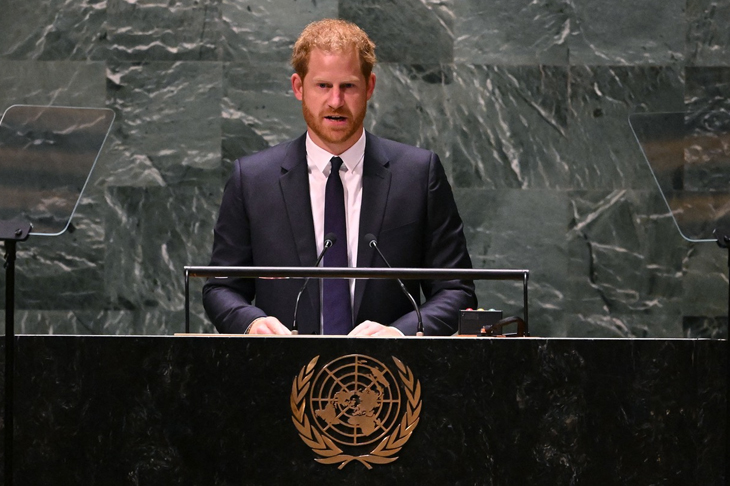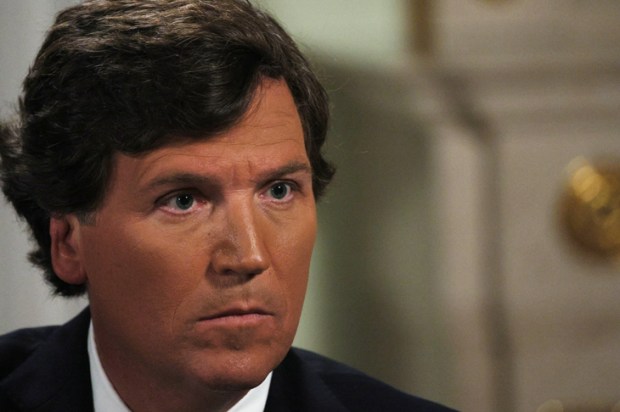If Mr Meghan Markle (sometimes known as Prince Harry, Duke of Sussex) can be relied upon for anything, it is to spew forth the latest and most impactful wokeisms, out-virtue-signalling even those who had the foresight or good luck to grow up in circumstances other than the lap of luxury. But, as befits someone whose own grandmother saw fit to give him the subsidiary title, Earl of Dumbarton – it is conceivable that Her Majesty had one or two more G&Ts than usual when she came up with that – Harry has an uncanny knack of putting his foot in it, even when reading a prepared speech.
And so it was when Harry was invited to speak at the United Nations to mark International Nelson Mandela Day, for no better reason than that his late mother once met the South African activist and subsequent president. Of course, Harry took aim at all the usual suspects. Global warming, or maybe it was climate change, was front and centre. This was closely followed by the Covid pandemic and the war in Ukraine.
But Harry could hardly let the occasion pass without drawing upon his unique insights as a feminist born in a male body. This was especially fitting, given that the 24 June decision of the US Supreme Court (SCOTUS) in Dobbs v. Jackson Women’s Health Organization – to overturn the half-century old ruling in Roe v. Wade – had passed virtually unnoticed by the mainstream liberal-left. That is, unless one takes into account some rather large demonstrations, and tens of thousands of articles and media reports in every part of the world. How could Harry go wrong, taking up the cause of women’s rights?
How indeed? There are myriad arguments which can be advanced for and against the decision in Dobbs, all of which have been thoroughly ventilated by people far better qualified than Harry. But nobody had made the crucial point that the decision was ‘a global assault on democracy’. Enter, stage left, the Duke of Sussex.
Put to one side that the jurisdiction of SCOTUS is confined by the territorial boundaries of the United States. Harry neglected to explain how a decision by SCOTUS can be a global ‘assault’ on anything. A touch of hyperbole is rarely fatal to an otherwise valid argument. But the decision in Dobbs does nothing to challenge democracy; its only substantive effect is to restore democracy. Under Roe v. Wade, no elected legislature or official could interfere with a woman’s right to abort, except in accordance with the rulings of nine unelected judges. For the future, such decisions will be made by elected representatives in the appropriate (state or federal) legislatures. How is this an ‘assault on democracy’?
The liberal-left believe – not without justification – that their political views stand a better chance of winning the day with a majority of unelected judges than with a majority of the electorate at large, especially since it falls within the power of a liberal-left president and Congress to expand the number of unelected judges until the requisite majority is achieved. But that does not make Dobbs an attack on democracy; it is the very antithesis of an attack on democracy.
As a judicial decision, Dobbs was unquestionably correct. Few of its critics even attempt to advance a serious argument to the contrary. Rather, they lament the consequences of the decision, and make an impassioned political argument for the protection of what are popularly (if incongruously) termed ‘reproductive rights’.
The odium and derision which has been heaped on the majority in Dobbs is entirely misdirected. Their decision does not interfere with reproductive rights; the Court has no power to do so, and the decision does not purport to do so. It merely acknowledges that, in a democracy – absent any overriding constitutional constraint – the decision is one for democratically elected members of the appropriate legislature.
In Australia, and every other mature democracy apart from the US, the ‘abortion issue’ has been dealt with, as is appropriate, in accordance with ordinary democratic processes. In the Irish Republic, a constitutional referendum was required to amend the Constitution to permit the legalisation of abortion: the amendment attracted almost two-thirds of votes cast, notwithstanding the Republic’s 78 per cent Catholic majority. Only in the US does the issue remain contentious, largely because Roe v. Wade was viewed widely, and accurately, as an illegitimate subversion of democracy.
Protestors who bemoan the decision in Dobbs have every right to feel aggrieved. But their anger is misdirected. If one is looking for somebody to blame, there are three possibilities: the Founding Fathers, who neglected to include feticide amongst the liberties guaranteed by the Bill of Rights; the majority in Roe v. Wade, who created the false narrative that the federal union is a kritarchy – a country ruled by all-powerful judges – rather than a democracy; and the voters who continue to elect both ‘pro-life’ and (paradoxically) ‘pro-gun’ representatives. The only innocents in all this palaver are the majority justices who stripped away the emperor’s 50-year-old new clothes.
The Founding Fathers could not retrospectively amend their oversight, even if any were left to attempt the experiment. Likewise, the majority in Roe v. Wade have all retired or expired. So, for those who seek to exclude abortion from control by democratically elected legislatures, the challenge is the same as in any other mature democracy: sally forth and convince your fellow voters. And if your fellow voters refuse to be convinced, that is the price we all pay for the privilege of living under a democratic system of government.
Got something to add? Join the discussion and comment below.
Get 10 issues for just $10
Subscribe to The Spectator Australia today for the next 10 magazine issues, plus full online access, for just $10.
You might disagree with half of it, but you’ll enjoy reading all of it. Try your first month for free, then just $2 a week for the remainder of your first year.














Comments
Don't miss out
Join the conversation with other Spectator Australia readers. Subscribe to leave a comment.
SUBSCRIBEAlready a subscriber? Log in